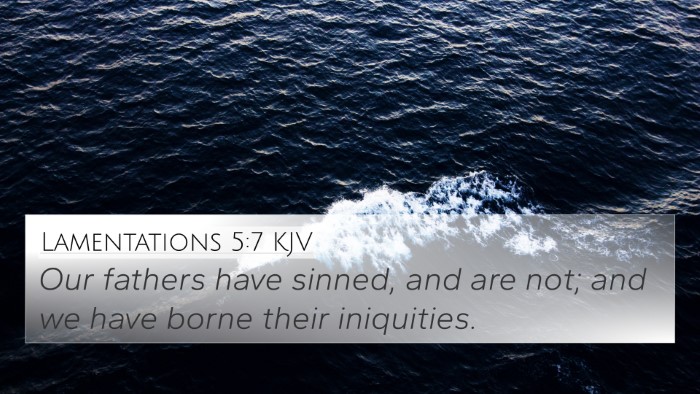Ezekiel 18:2 - Understanding the Context and Meaning
Ezekiel 18:2 states, “What mean ye, that ye use this proverb concerning the land of Israel, saying, The fathers have eaten sour grapes, and the children's teeth are set on edge?” This verse opens a critical conversation about the nature of personal responsibility and the injustices present in the beliefs of the Israelite people during Ezekiel’s time.
Analysis of Ezekiel 18:2
In this verse, God addresses the Israelites who held the proverb that suggested the children suffer for the sins of their parents. This reflects a common belief that one's descendants bear the consequences of their forebears' actions, a perspective that challenges the justice of God.
Contextual Background
The Israelites had suffered under the consequences of their collective sins, and in their anguish, they began blaming their circumstances on the actions of previous generations—primarily their parents. God, through Ezekiel, seeks to clarify His stance on individual accountability and righteousness.
Insights from Commentaries
-
Matthew Henry:
Henry emphasizes that this proverb reflects a fatalistic approach to sin and justice. He explains that God highlights the irrationality in this belief, pointing out that each person is judged for their own actions rather than those of their ancestors.
-
Albert Barnes:
Barnes notes that the proverb is a misrepresentation of God's justice. He interprets it as an expression of despair among the Israelites, showing their unwillingness to accept personal responsibility for their actions. This verse serves as a divine rebuke to such thinking.
-
Adam Clarke:
Clarke points out that the proverb indicates a wider issue of social justification for sin and rebellion against God's law. He argues that such thinking undermines the fundamental principle that every individual is accountable to God.
Key Themes in Ezekiel 18:2
The key themes that can be drawn from this verse involve:
- Personal Responsibility: Each individual is responsible for their own sin (Ezekiel 18:30).
- Divine Justice: God’s justice is impartial and directly associated with one’s actions (Romans 14:12).
- Rejection of Fatalism: The fallacy of blaming one's circumstances on preceding generations (Lamentations 5:7).
- The Nature of Sin: Understanding sin’s impact across generations (Exodus 20:5-6).
Bible Cross References
To further understand the themes present in Ezekiel 18:2, cross-referencing with related scriptures is helpful:
- Jeremiah 31:29-30: “In those days they shall no more say, The fathers have eaten a sour grape, and the children's teeth are set on edge.”
- Deuteronomy 24:16: “Fathers shall not be put to death for the children, neither shall the children be put to death for the fathers: every man shall be put to death for his own sin.”
- Romans 14:12: “So then every one of us shall give account of himself to God.”
- Galatians 6:5: “For every man shall bear his own burden.”
- 2 Corinthians 5:10: “For we must all appear before the judgment seat of Christ; that every one may receive the things done in his body, according to that he hath done, whether it be good or bad.”
- Ezekiel 18:30: “Therefore I will judge you, O house of Israel, every one according to his ways, saith the Lord God.”
- Hebrews 3:12: “Take heed, brethren, lest there be in any of you an evil heart of unbelief, in departing from the living God.”
Connecting Themes Across Scriptures
Ezekiel 18:2 serves as a pivotal point in understanding individual accountability in scripture. It connects to numerous other verses that highlight similar themes:
- Responsibility in Relationships: Connections can be drawn to Exodus 34:7, which speaks of God visiting the iniquity of the fathers upon the children, emphasizing the generational aspect yet balancing it with the call for individual righteousness.
- Justice and Mercy: Matthew 12:36 indicates that we will be held accountable for every idle word we speak, reinforcing the call to personal responsibility in life choices.
- Personal Accountability: Philippians 2:12 encourages believers to work out their own salvation with fear and trembling, highlighting an individual’s relationship with God.
Conclusion
In summary, Ezekiel 18:2 can be appreciated in its depth concerning the themes of personal responsibility, divine justice, and the erroneous nature of blaming previous generations for one’s circumstances. By utilizing tools for Bible cross-referencing, such as concordances and guides, believers can delve deeper into the interconnectedness of scriptural texts, facilitating a comprehensive understanding of Biblical teaching.
By examining the connections between Bible verses, one can appreciate the continuity of God’s message throughout Scripture and how these truths apply directly to our lives today.
















